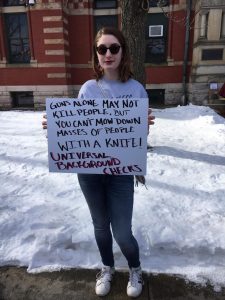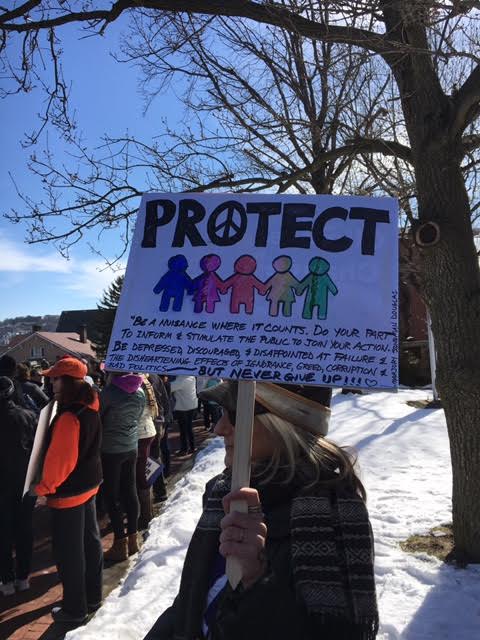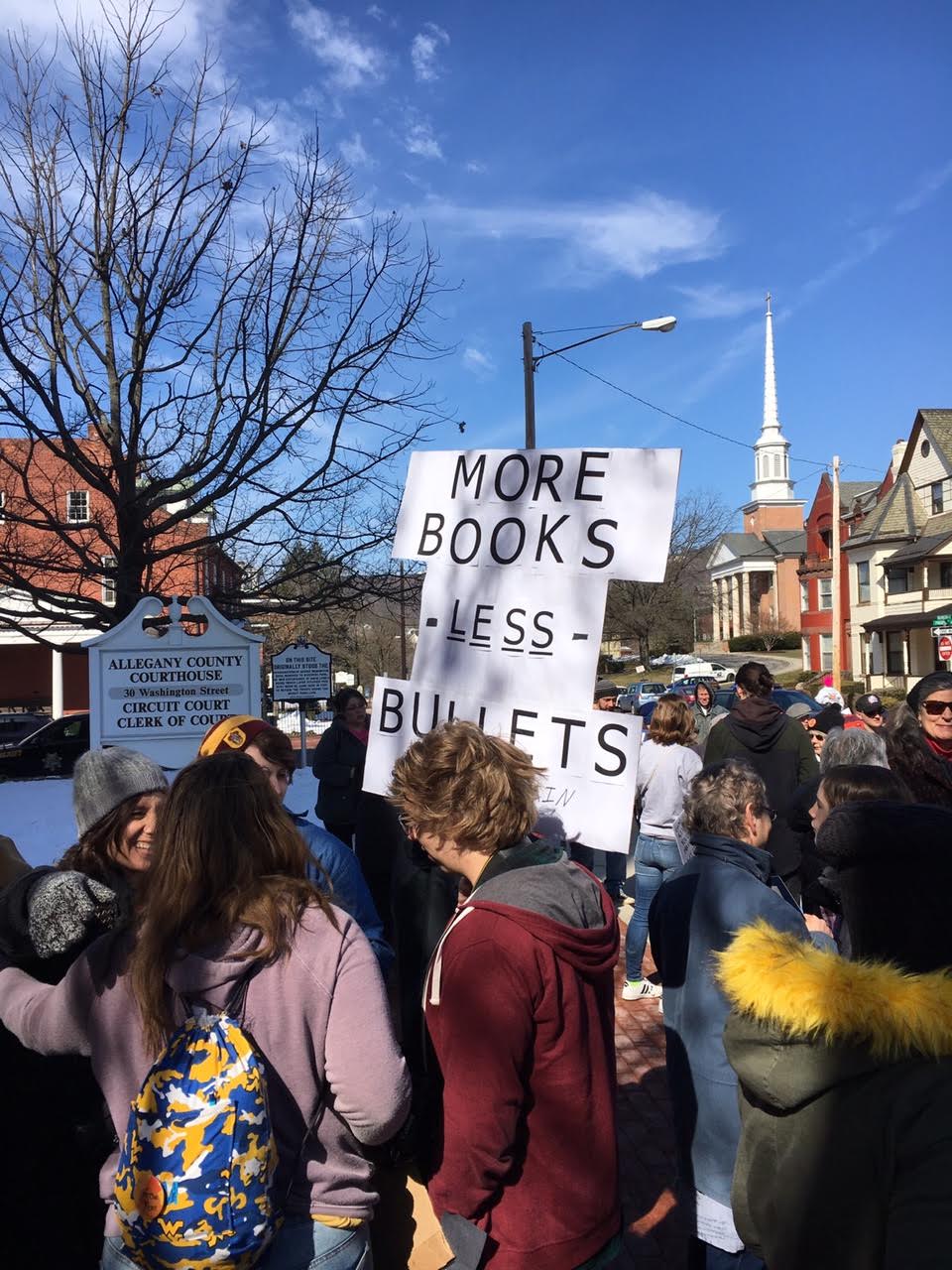Western Marylanders March for gun sanity
Can you hear the prayer of the children?
On bended knee, in the shadow of an unknown room
Empty eyes with no more tears to cry
Turning heavenward toward the light
‘Prayer of the Children’ by Kurt Bestor
Ellen McDaniel-Weissler expected about 100 residents to show up on a sub-freezing morning at the Allegany County Courthouse in Cumberland, Md. to stand in solidarity with the March 24, Washington, D.C. “March for Our Lives.”
A former teacher and two-time survivor of gun violence, McDaniel-Weissler, organizing under the umbrellas of Every Town For Gun Sense in America and the national headquarters of March for Our Lives, had contacted local high school students who wanted to take action to reform gun laws and stop school shootings in the wake of the Feb. 14 Parkland, Florida shooting at Marjory Stoneman Douglas High School. They publicized the march on Facebook and got some airtime on local radio channels.
Cumberland City Councilman Eugene Frazier made the rounds distributing professionally printed signs saying, “March for our Lives” as more than 225 men, women, and children, from Maryland and neighboring communities in West Virginia and Pennsylvania made their way up Washington St. to the courthouse.
Some, like Nathan Pack, a student at Cumberland’s Center for Career & Technical Education, carried handmade signs. Pack’s was a four-foot high white placard with black letters saying, “More Books Less Bullets.”
 On the sidewalk facing the arriving marchers, Sarah Parsons and Betsey Hurwitz-Schwab, members of the Women’s Action Coalition, staffed a table encouraging participants to register to vote. The coalition, based in greater Allegany County, was born out of the National Women’s March in 2017, said Parsons. “We are open to women and men and members of all political parties. We have several action groups and encourage face-to-face dialogue,” she said.
On the sidewalk facing the arriving marchers, Sarah Parsons and Betsey Hurwitz-Schwab, members of the Women’s Action Coalition, staffed a table encouraging participants to register to vote. The coalition, based in greater Allegany County, was born out of the National Women’s March in 2017, said Parsons. “We are open to women and men and members of all political parties. We have several action groups and encourage face-to-face dialogue,” she said.
“I’m here to support the kids. They are my heroes. They are amazing,” said Chris Blom, a Western Maryland resident who moved from Baltimore 20 years ago.
Cheri Alt, a teacher from Mineral County, W. Va., showed up with her three children. Her sign, said, “One Child is Worth More than All the Guns on Earth.” Kids are already feeling schools are unsafe,” said Alt. Teachers carrying guns in the classroom, she said, would only ratchet up the stress levels. “I want to teach,” said Alt. “If we want our kids to be safe, we should focus not on arming educators, but on smaller schools, better mental health counseling, and better-paid teachers,” she added.
As activists circulated petitions calling upon the White House and Congress to take action on gun safety, McDaniel-Weissler introduced the first of several high school student speakers who addressed marchers on the courthouse steps and, later, on the march route—at the Western Maryland Railway Station and the day’s destination point, Cumberland City Hall.
“This isn’t my march. This belongs to the students,” said McDaniel-Weissler, commending students for conducting the research cited in their remarks and having the courage to speak out in a community where the National Rifle Association has thousands of members.
Most students addressed the fear of violence on school premises that is today interfering with learning. “Something should have changed after the shootings at Columbine High School in 1999,” said Alison Atkinson, a student at Allegany High School.
“We should not become desensitized to all the shootings we see happen and to have the attitude it may never happen to you or your school,” said Joshua Mitchell, a student at Mountain Ridge High School in nearby Frostburg, Md. Mitchell cited statistics on how an increase in the number of guns in homes creates “even more volatile situations” within family conflicts and domestic confrontations.
 “Before marchers headed for the train station, chanting, “Never Again!” the names of 17 teachers and students killed in Parkland, Fla. were read, a bell ringing out after each name. On the march route, participants thanked Cumberland Police Department officers for temporarily halting traffic to permit the march to proceed.
“Before marchers headed for the train station, chanting, “Never Again!” the names of 17 teachers and students killed in Parkland, Fla. were read, a bell ringing out after each name. On the march route, participants thanked Cumberland Police Department officers for temporarily halting traffic to permit the march to proceed.
“None of this [gun violence] has to happen,” said Brandon Hudson, a junior at Fort Hill High School in Cumberland, at the train station. The world is a different place since the framing of the Second Amendment of the U.S. Constitution, he said, joining other speakers who pressed for improved background checks and plugging loopholes that allow guns to be traded at gun shows without checks, along with a banning of military-grade assault weapons and ammunition clips.
Also at the train station, accompanied by a cello, McDaniel-Weissler sang “Prayer of the Children,” written by Kurt Bestor during the Bosnian-Serb conflict in the territory of the former nation of Yugoslavia.
“Hey, Hey, Ho, Ho, Guns in School Have Got to Go!” “Thoughts and Prayers are Not Enough” and “Power to the People,” chanted marchers on the way to Cumberland City Hall.
During an open mic session at city hall, speakers, including gun owners, called upon politicians to enact reasonable measures to help stanch the daily violence that haunts U.S. cities.
Caitlin, a freshman at nearby Allegany College recalled how, growing up in a tough neighborhood, her mother told her to switch locations in her bedroom to keep from being shot by stray gunfire on the street. “I never thought I would have to be prepared to do the same thing in college,” she said. Encouraging marchers to spread the word of Cumberland’s march on Instagram, Facebook, and Twitter, she said, “Be loud. Be proud. Don’t Be Quiet!”
“I woke up this morning and watched the news [about the March for Our Lives in D.C.]. I cried,” said Carmen Jackson, president of the Allegany County chapter of the NAACP. “I remember laying on the floor to keep from getting shot growing up in the Cabrini-Green public housing project on the north side of Chicago,” Jackson said.
She recalled her mother running out of the house to protect her brother as the Bloods and Crips gangs endangered the neighborhood.
“I am so proud to see our community standing up,” said Jackson. “We have lost more people to gun violence on the streets of the U.S. than in Afghanistan. Our children, our teachers, and our policemen should be able to go home unharmed. We can be a safe society,” said Jackson.
Shane, an Allegany County resident, said, “I’m a lifetime gun owner,” recalling his grandfather an NRA member and his attendance in the group’s gun safety classes.
“There are a lot of gun owners, including many folks on the march, who support your goals [sensible gun laws], but I urge you to learn about guns and to be accurate when talking about what needs to be done,” he told marchers. Most weapons used in mass shootings were purchased legally, he said. But, loopholes must be closed that allow guns to get into the wrong hands. “This shouldn’t be a partisan issue. Even Ronald Reagan was in favor of reasonable gun measures.”
After his remarks, Shane stood in the courtyard facing city hall, just across from a plaque inscribed, “Mourn for the Dead, Fight for the Living—Workers Memorial Day-April 28,” erected in 2002 by the Western Maryland AFL-CIO. He said he didn’t want his surname used in print because he had faced harassment in his neighborhood from zealous gun owners for his advocacy of “sensible” gun laws. “Thank goodness [the young folks] will all be voting soon,” he said.
In final remarks, McDaniel-Weissler challenged the accusations of the NRA and gun owners who say the March for Our Lives is about confiscating guns from legal owners.
McDaniel-Weissler said, “Let me give you a little primer on the Second Amendment.” She outlined the nation’s history of militias and one-time wariness of a “standing army” and described the terror of plantation owners who sought to protect “slave patrols” to keep slaves from escaping. McDaniel-Weissler said, “Today, we have a standing army. And, thank God, we no longer have slavery.” We are a nation of laws and the Second Amendment recognizes the need for a ‘well-regulated’ militia, she said. “That doesn’t mean everyone gets a military-grade assault weapon. She encouraged participants to hold their elected representatives accountable before, during and after the upcoming Midterm elections. “Just look at what happened in Pennsylvania’s 18th Congressional District,” she said.
Marchers leaving city hall recognized the difficulties ahead in building a consensus in their communities for sensible gun laws. Emma McConnell, a Fort Hill High School student, said, “Little events [like the march] will change things in our community.” But McConnell, deriding the extremism of the NRA in opposing federal studies into the causes of gun violence, said her fellow students are divided and often refuse to engage in constructive dialogue on the issue.
Nadine Grabania, a Friendsville, Md. (Garrett County) resident who was one of the leaders of Citizen Shale, a group opposing fracking in Maryland, held a brightly-colored sign showing people holding hands. It read:
“PROTECT. Be a nuisance where it counts. Do your part to inform and stimulate the public to join your action. Be depressed, discouraged and disappointed at failure and the disheartening effects of ignorance, greed, corruption and bad politics. BUT NEVER GIVE UP!!!”
I’m here representing my daughter who is in high school, but couldn’t make it today, said Grabania.

Len Shindel began working at Bethlehem Steel’s Sparrows Point Plant in 1973, where he was a union activist and elected representative in local unions of the United Steelworkers, frequently publishing newsletters about issues confronting his co-workers. His nonfiction and poetry have been published in the “Other Voices” section of the Baltimore Evening Sun, The Pearl, The Mill Hunk Herald, Pig Iron, Labor Notes and other publications. After leaving Sparrows Point in 2002, Shindel, a father of three and grandfather of seven, began working as a communication specialist for an international union based in Washington, D.C. The International Labor Communications Association frequently rewarded his writing. He retired in 2016. Today he enjoys writing, cross-country skiing, kayaking, hiking, fly-fishing, and fighting for a more peaceful, sustainable and safe world for his grandchildren and their generation. Shindel is currently working on a book about the Garrett County Roads Workers Strike of 1970 www.garrettroadstrike.com.


Thank you for your detailed coverage of yesterday’s inspiring #MarchForOurLives “sister” march in Cumberland! Want to clarify that I cannot take credit for the quote on my sign. It is a statement from Marjory Stoneman Douglas—now relevant in an entirely new context—for whom Florida’s Parkland High School is named. (The attribution to the environmentalist, who worked to protect the Everglades, runs up the side of the sign.)
Thanks, Len, for taking the time to cover our march. The kids’ voices deserve to be heard, and you have made that possible!